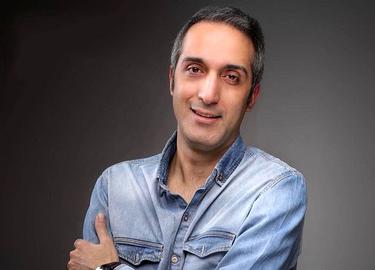“The restrictions and censorship in Iran are a bit like the British weather,” says two-time Academy Awards winner Iranian director Asghar Farhadi. “One day it's sunny, the next day it's raining. You just have to hope you walk out into the sunshine.”
Farhadi could have added that, more often than not, when it rains, it pours.
Recently the hashtag “#TheCensor_And_I” (#من_و_سانسورچی in Persian) has been trending among Iranian artists and writers, many of whom have come forward with anecdotes about their own experiences with Iranian censorship — anecdotes that frequently border on the absurd.
Amir Jouleh, an Iranian satirist, journalist, movie actor and scriptwriter, started using the hashtag and invited other artists, journalists and writers to share their stories. He told of his own brush with censors when he was working on the popular satirical TV series Barareh Nights for state-run Iranian TV. “One of the objections to airing the episode was why the bulge of the ear of [the actress] Shaghayegh Dehghan was discernible from under her headscarf!” he wrote. “Note: not the ear itself, but the ‘bulge’. We never figured out what they found arousing about a bulge under a headscarf.”
Zhoole has quite a few more stories, including that the scene from an episode of a TV series was cut because the actress was eating a cucumber. Another scene was cut because an actress' throat was showing.
For Iranian artists, writers and journalists, censorship is an everyday experience. So it took only hours for others to join Zhoole, using the same hashtag to tell their own outlandish experiences. One of them was the actress Mitra Hajjar, who posted a video (in Persian) showing how her ears were Scotch-taped back so that they would not show from under her headscarf. And actress Bahareh Rahnama wrote that she was warned not to laugh in a way so that her teeth would show. A whole episode of her TV show, which she appears in with her husband, was not aired because of her “devastating laughs,” she wrote.
The “Arousing” Water Buffalo
But Iranian state-run TV is not only sensitive to female body parts. Even animals do not escape the scrutiny of the censors. “They said that showing water buffalo coming out of the water, especially from behind, is arousing,” wrote director and scriptwriter Mostafa Kiayee.
The censors also clampdown on neckties. Pedram Soltani, a businessman and a member of Iran’s Chamber of Commerce, talked of his experiences. “During the few times that I was interviewed on TV,” he writes, “the camera came so close [to my face] that I felt my nose was protruding from the TV screen! And sometimes they tried to mask my tie with the microphone.”
If a tie can be so controversial, it comes as no surprise that when Iranian TV broadcasts a foreign film, it crops the frame to prevent even a little bit of a woman’s neck or chest from showing, often in a way that is so severe that the scene becomes almost meaningless.
Censors block out women’s hair and body parts from foreign films, and also any romantic scenes and kisses. Even in books, such scenes are changed, so that words such as “smile” or “glance” replace more explicit language.
...And the Obscene Roman Wolf
This, of course, has been going on for four decades. What has changed is that now people hear and read about this censorship, especially on social media. The list of what is censored, with or without intelligible logic, is long — very long. One recent example occurred on April 4. Iranian TV broadcast the football match between Italian team Roma and Spain’s Barcelona, but blurred a shot that showed Roma’s logo. The reason? The logo features a wolf breastfeeding two babies and its breasts are clearly visible — a reference to a well-known myth about the founding of Rome. The act of censorship was so preposterous it made the news not only in Iran but across Europe as well.
In some cases, TV censors even do away with the whole animal. In preparation for airing the 2013 Canadian movie Against the Wild, censors edited the film so that a family dog was replaced with a door. No reason was given for the edit, but traditionally some people in Iran consider dogs to be unclean and most probably the censors did not want to encourage viewers to allow dogs inside their homes.
In June 2018, The Islamic Republic of Iran Broadcasting (IRIB) canceled an appearance by retired Spanish footballer Carles Puyol on Iranian TV because his hair was found to be “too wild.” “We have all had bad hair days, times when grooming didn't quite work out, but it's rare we expect our carefully-maintained, glossy locks to land us in trouble,” a BBC report read. “When former Barcelona football star Carles Puyol accepted a spot to provide World Cup commentary on Iranian television, he probably did not think his trademark long curly hair would be cause for concern. The footballer was billed to feature in a Channel 3 special program for the Iran-Spain match on Wednesday, alongside host Adel Ferdosipour. But after travelling to Iran and to the IRTV 3 Tehran studio, Mr. Puyol was denied entry.”
Music Without Instruments
Iranian TV censors people and animals, but also objects. One prominent example is the fact that Iranian TV never shows musical instruments. Even during a live musical performance in its own studios, the camera is either behind the musicians or images of walls or flowers are aired while they play.
If nothing else, IRIB’s censorship has turned into a lucrative subject of fun and ridicule for Iranians on social media, most of whom believe the censorship is an insult to the intelligence of the Iranian people.
But perhaps IRIB does not get away totally scot-free. On May 30, the US Department of the Treasury’s Office of Foreign Assets Control (OFAC) added Abdulali Ali-Asgari, IRIB’s director, to its sanctions list. “IRIB was designated...for restricting or denying the free flow of information to or from the Iranian people,” announced the website of the Treasury Department. “IRIB was implicated in censoring multiple media outlets and airing forced confessions from political detainees.”
US also sanctioned other individuals for “having engaged in censorship or other activities with respect to Iran that prohibit, limit, or penalize the exercise of freedom of expression or peaceful assembly by citizens of Iran, or that limit access to print or broadcast media.” The two individuals are Abolhassan Firouzabadi, Secretary of Iran’s Supreme Council of Cyberspace, “responsible for the Iranian government’s efforts to block social media applications like Telegram and to force Iranians to use state-run applications that are monitored by the regime,” and Abdolsamad Khoramabadi, Secretary of the Committee to Determine Instances of Criminal Content, for “filtering and blocking of political content during elections," for tasking “the Basij to lead the regime’s crackdown on cyber activity,” and for its assertions that “the country had thousands of monitors to report violations of websites and social media networks.”
But it remains an open question whether the sanctions will have an effect on censorship in the Islamic Republic, and whether they will help usher in greater freedoms for the Iranian people.
More on censorship in Iran:
The Ban on Telegram, April 30, 2018
Iran Censors Rome’s Ancient She-Wolf, April 7, 2018
“Traitor” Journalist Suspended and Demoted for Tweet, February 16, 2018
Censorship and Self-Censorship During the Protests, December 31, 2018
Why Does Iranian State TV Censor Movie Trailers?, December 7, 2017
Iran’s Authorities in New Crackdown on Journalists, October 17, 2017
The Menace of Censorship, July 26, 2017
The Censorship of Forced Hijab, June 22, 2017
Iranian Cartoonist "Tired of Living a Criminal Life", May 25, 2017
World Press Freedom Day: Iran's Journalists Face Arbitrary Arrest and Persecution, May 3, 2017
Iran State Media “Lawless”, April 10, 2017
Shirin Ebadi: With Advances in Technology Come Advances in Censorship, March 7, 2017




























comments